MEDIA WATCH: Sun-Times exposes hypocrisy of Board of Education members who always voted unanimously and without debate in favor of every proposal by CPS officials -- including the infamous no-bid $20.5 million SUPES contract!...
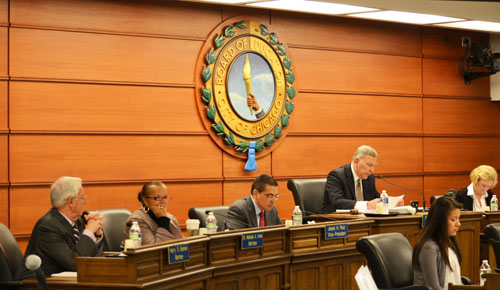 Five of the seven members of the Chicago Board of Education during the March 26, 2014 meeting of the Board. Left to right: Henry Bienen, Mahalia Hines, Jesse Ruiz, David Vitale, and Deborah Quazzo. Not shown in this photograph were Carlos Azcoitia and Andrea Zopp. (See next photos). Substance photo by George N. Schmidt.An excellent reporting job by the Chicago Sun-Times, available to print readers in a two-page spread on August 3, 2015 [see below], exposes the fact that virtually all of the members of the Chicago Board of Education have voted unanimously in favor of whatever was brought before them by CPS officials since May 2011. May 2011 was when David Vitale was made President of the Board by Mayor Rahm Emanuel and the members of the Board who had served under former Mayor Richard M. Daley were purged from the Board. The August 3 Sun-Times reporting quotes every Board member who was willing to speak with the Sun-Times. All are justifying the routine votes as if their refusal to discuss their agendas in public and their hundreds of unanimous votes were the kind of thing that should be done every day in a democracy.
Five of the seven members of the Chicago Board of Education during the March 26, 2014 meeting of the Board. Left to right: Henry Bienen, Mahalia Hines, Jesse Ruiz, David Vitale, and Deborah Quazzo. Not shown in this photograph were Carlos Azcoitia and Andrea Zopp. (See next photos). Substance photo by George N. Schmidt.An excellent reporting job by the Chicago Sun-Times, available to print readers in a two-page spread on August 3, 2015 [see below], exposes the fact that virtually all of the members of the Chicago Board of Education have voted unanimously in favor of whatever was brought before them by CPS officials since May 2011. May 2011 was when David Vitale was made President of the Board by Mayor Rahm Emanuel and the members of the Board who had served under former Mayor Richard M. Daley were purged from the Board. The August 3 Sun-Times reporting quotes every Board member who was willing to speak with the Sun-Times. All are justifying the routine votes as if their refusal to discuss their agendas in public and their hundreds of unanimous votes were the kind of thing that should be done every day in a democracy.
Of course, in a "Communist" or "socialist" country, these same claims by public officials would be ridiculed as totalitarian. As Substance has noted for years in our monthly (and complete) reporting on the Chicago Board of Education's meeting, it's Orwellian.
But while the Sun-Times report catches the nine members of the Board in their hypocrisy (the story goes back to the first Board meetings, in June 2011, when Penny Pritzker and Rodrigo Sierra were members of the Board), it still misses the cover up that continues to this month. Illinois law requires that public business be discussed in public at public meetings, yet since Rahm Emanuel's Board took power, that is that last thing the Board has done. 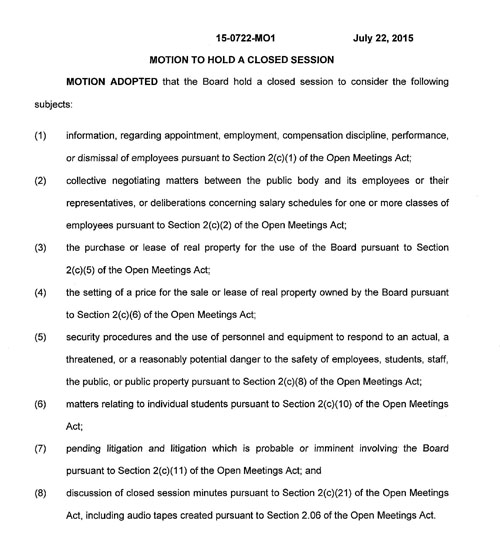 At every meeting of the Chicago Board of Education, the public participation is followed by a few remarks from Board members, usually critical of someone who has spoken during the constrained "public" comments (which the Board has been choking off since David Vitale became Board president in May 2011). Immediately after those remarks, which the people discussed are not presented to respond to, Vitale nods to one of the Board members, usually Mahalia Hines, who reads the motion to go into a Closed Session, as permitted under the Illinois Open Meetings Act. What is not legal, under the Open Meetings Act, is that all of the actual discussion of items before the Board be done out of sight of the public, but that's what the Board has been doing under Vitale. The above graphic is the Board Report form the Action Agenda of the July 22, 2015 meeting of the Board, the last one chaired by David Vitale. Not only has the Board refused to discuss multi-million dollar (and in some cases, billion dollar) items in public, but the Board members have also been voting unanimously and without debate to erase whatever discussions they may or may not have had in secret. The Illinois Open Meetings Act is regularly being violated by the Board of Education of the City of Chicago. One quote from Board President David Vitale sums up the smug arrogance with which Vitale and the Board viewed democracy and Illinois law during their time in power. According to Vitale, the Board reached "consensus" on these matters, and therefore the Board's public votes were unanimous.
At every meeting of the Chicago Board of Education, the public participation is followed by a few remarks from Board members, usually critical of someone who has spoken during the constrained "public" comments (which the Board has been choking off since David Vitale became Board president in May 2011). Immediately after those remarks, which the people discussed are not presented to respond to, Vitale nods to one of the Board members, usually Mahalia Hines, who reads the motion to go into a Closed Session, as permitted under the Illinois Open Meetings Act. What is not legal, under the Open Meetings Act, is that all of the actual discussion of items before the Board be done out of sight of the public, but that's what the Board has been doing under Vitale. The above graphic is the Board Report form the Action Agenda of the July 22, 2015 meeting of the Board, the last one chaired by David Vitale. Not only has the Board refused to discuss multi-million dollar (and in some cases, billion dollar) items in public, but the Board members have also been voting unanimously and without debate to erase whatever discussions they may or may not have had in secret. The Illinois Open Meetings Act is regularly being violated by the Board of Education of the City of Chicago. One quote from Board President David Vitale sums up the smug arrogance with which Vitale and the Board viewed democracy and Illinois law during their time in power. According to Vitale, the Board reached "consensus" on these matters, and therefore the Board's public votes were unanimous.
�'Matters only reached the board meeting for action after such consensus had been achieved,' he wrote [in an email answering the Sun-Times questions. 'So it is not surprising that your data shows relatively few no votes as significant briefing, discussion and changes to action items were frequently negotiated to develop that consensus. Furthermore, your data would not reflect items that never came before the board for action because consensus could not be achieved.'�
What Vitale leaves out is the fact that the discussions, "briefings," and other activities that led to that "consensus" were required -- by Illinois law -- to be done at meetings, and that those meetings were covered by the Illinois Open Meetings Act. What Vitale's discussion of "consensus" is actually doing is admitting that the nine people who served on the Board since May 2011 were routinely violating the law. Two of those people, Jesse Ruiz and Andrea Zopp, were lawyers, and a third, Penny Pritzker, has a law degree. It is thus a fact that the Board of Education's members have just admitted to having been in violation of the law for more than four years. You can't "reach consensus" without meeting, despite what Vitale says, and you certainly can't have "briefings" without meetings, and yet there is nothing in the public record to indicate what was included in those briefings and what was said or not said during those "briefings." 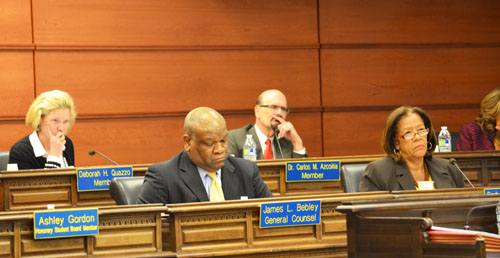 The ability of the Chicago Board of Education to routinely violate the letter and spirit of the Illinois Open Meetings Act is enabled by the Board's massive Law Department, headed by James Bebley (above, second from left). Virtually every Board Report that has come before the Board, including the infamous $20.5 million SUPES contract in June 2013, was "approved as to legal form" by the Law Department. Bebley has also been present at every Board meeting while the Illinois Open Meetings Act was circumvented or outright violated when the Board held all of its discussions of important matters in Closed Session, then voted to destroy the audio tapes of the Closed Session sessions. Above, left to right, are Deborah Quazzo, James Bebley, Carlos Azcoitia, Barbara Byrd Bennett, and (half obscured) Andrea Zopp. Substance photo from the March 26, 2014 Board meeting by George N. Schmidt.As suspected by many (including Substance reporters) during the years since the first Rahm Emanuel Board was appointed, the purpose of the public meetings of the Board of Education was to cover up the decisions of the Board, not to comply with the law and the requirements of decency in a democracy. As Substance reported every month, the Board of Education regularly came out of executive session and voted to approve all the items on the agenda "without discussion or debate."
The ability of the Chicago Board of Education to routinely violate the letter and spirit of the Illinois Open Meetings Act is enabled by the Board's massive Law Department, headed by James Bebley (above, second from left). Virtually every Board Report that has come before the Board, including the infamous $20.5 million SUPES contract in June 2013, was "approved as to legal form" by the Law Department. Bebley has also been present at every Board meeting while the Illinois Open Meetings Act was circumvented or outright violated when the Board held all of its discussions of important matters in Closed Session, then voted to destroy the audio tapes of the Closed Session sessions. Above, left to right, are Deborah Quazzo, James Bebley, Carlos Azcoitia, Barbara Byrd Bennett, and (half obscured) Andrea Zopp. Substance photo from the March 26, 2014 Board meeting by George N. Schmidt.As suspected by many (including Substance reporters) during the years since the first Rahm Emanuel Board was appointed, the purpose of the public meetings of the Board of Education was to cover up the decisions of the Board, not to comply with the law and the requirements of decency in a democracy. As Substance reported every month, the Board of Education regularly came out of executive session and voted to approve all the items on the agenda "without discussion or debate."
But there is more. Despite the law, the Board members have been voting to destroy the public record of those private discussions. The only pieces of the Board of Education's ruthless attacks on democracy that are left out of the August 3 Sun-Times report are the fact that the Board has been voting to destroy the records of what they discuss in secret at each of their monthly meeting, and that the Board has been strangling the public participation portion of each meeting by limiting the number of public speakers for the first time in Chicago history.
The Open Meetings Act requires that the Board of Education retain both a written and an audio record of its "Closed Session" meetings. But the Board is given a loophole: They can vote to maintain as "confidential" the record of the closed session under certain conditions. And so, at every meeting, they have voted to retain as confidential those records and, also, they have voted to dispose of the audio records of those same meetings.
Given the fact that the Board of Education has spent more time in its closed sessions than in its public meetings, the publication of the records of those closed session discussions is crucial if the public is ever to learn whether any of the members of the Board has ever expressed criticism of any of the proposals coming from the executives that the Board has appointed. There are other small items included as well in the Board's cover ups. For example, the Board has apparently been approving, in secret, the appointment of expensive administrative, legal, and consulting people without revealing their salaries, benefits, and jobs -- as required by law and Board policy. Those facts only become obvious when Substance compares the latest iteration of the Board's "Position File" (the spreadsheet listing all those who work for CPS, along with their departments, job titles, salaries, and other information) with the final record of each Board meeting. The final record of everything the Board has voted to approve is included at www.cps.edu in a report called the "Action Agenda." So, within its limitations, the Sun-Times has done another valuable service to democracy in Chicago. Comparing the reporting in the Sun-Times with the lack of reporting in the Chicago Tribune, the scandal is growing.
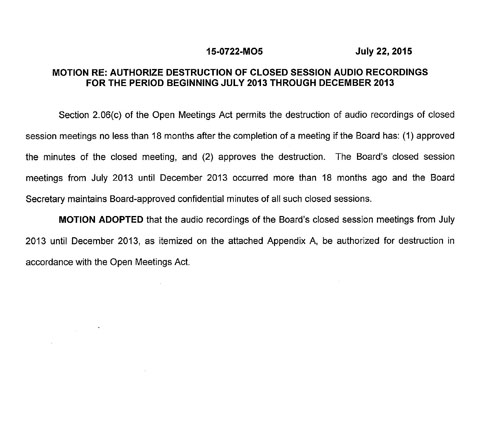 The Vitale Board of Educaion has exploited a loophole in the Illinois Open Meetings Act buy destroying the only complete record of what each Board member said during the Closed Sessions of the Board meetings. Since nothing was said during the public meetings of the Board on key items on the public agenda, the discussions, if any, had to either be held in violation of the Open Meetings Act or during Closed Session. But the Board of Education routinely voted to destory the audio records of the Board meetings, as the Motion from the July 22, 2015 Board meeting shows. The Sun-Times article:
The Vitale Board of Educaion has exploited a loophole in the Illinois Open Meetings Act buy destroying the only complete record of what each Board member said during the Closed Sessions of the Board meetings. Since nothing was said during the public meetings of the Board on key items on the public agenda, the discussions, if any, had to either be held in violation of the Open Meetings Act or during Closed Session. But the Board of Education routinely voted to destory the audio records of the Board meetings, as the Motion from the July 22, 2015 Board meeting shows. The Sun-Times article:
Unanimous SUPES vote typical for Board of Ed, analysis shows. WRITTEN BY BY LAUREN FITZPATRICK AND JORDYN HOLMAN POSTED: 08/02/2015, 10:57AM
When the Chicago Board of Education unanimously approved a $20.5 million, no-bid contract with the former CEO�s previous employer that�s now under federal investigation, the members were voting the way they typically do, a Chicago Sun-Times analysis shows.
And the newly constituted board � which includes four more new members already in place under a new president who will take over meetings in August � voted unanimously to approve all of CPS� proposals on July 22, according to the district.
Outgoing board president and banker David Vitale, who cast one of the six votes for the SUPES Academy deal in June 2013, never cast a dissenting vote since he began voting in June 2011, the Sun-Times analysis shows. Three other board members who have served partial terms also never voted against CPS recommendations: investor Deborah Quazzo, businesswoman and now Secretary of Commerce Penny Pritzker and corporate spokesman Rod Sierra.
The Sun-Times looked at voting records from about 50 board meetings held since the middle of 2011 when Mayor Rahm Emanuel appointed his chosen seven members. Two of those members changed in 2013. Several of the nine total told the Sun-times no one ever told them how to vote.
Board vice president Jesse Ruiz, an attorney, and Henry Bienen, president emeritus of Northwestern University, dissented just once each.
Former principal Mahalia Hines, who along with Ruiz remains on the board, and U.S. Senate candidate Andrea Zopp each disagreed with CPS in three votes.
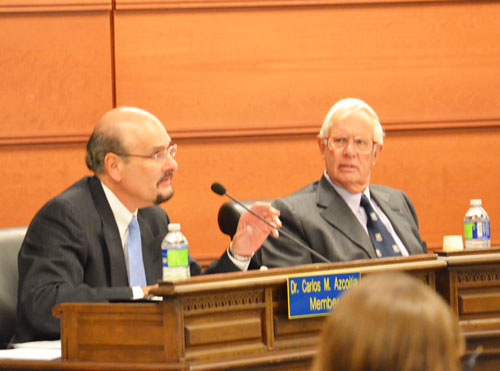 Although Board member Carlos Azcoitia voted against the majority on more motions than any other Board member and told the Sun-Times that he would have voted "No" on the SUPES contract, Azcoitia voted with the consensus every time the Board voted to seal the records of the Closed Sessions of the Board meetings -- and to destroy the audio tapes kept by the Board secretary during those closed sessions. Above, Azcoitia is seen asking a question during the January 23, 2013 meeting of the Board, while Henry Bienen looks on. Substance photo by George N. Schmidt.The most public dissent came from former principal Carlos Azcoitia, who voted against CPS nine times during his partial term from January 2013 to June 2015.
Although Board member Carlos Azcoitia voted against the majority on more motions than any other Board member and told the Sun-Times that he would have voted "No" on the SUPES contract, Azcoitia voted with the consensus every time the Board voted to seal the records of the Closed Sessions of the Board meetings -- and to destroy the audio tapes kept by the Board secretary during those closed sessions. Above, Azcoitia is seen asking a question during the January 23, 2013 meeting of the Board, while Henry Bienen looks on. Substance photo by George N. Schmidt.The most public dissent came from former principal Carlos Azcoitia, who voted against CPS nine times during his partial term from January 2013 to June 2015.
He was out of the country on the day of the SUPES vote and missed it but told the Sun-Times:
�Had I been in that meeting, I would have voted �no.� I�m sure I would have voted no like I would have done in other cases. We couldn�t approve that after closing 50 schools,� he said.
Earlier this year, in mid-April, federal subpoenas were sent to CPS seeking records concerning CEO Barbara Byrd-Bennett, three of her top aides, and SUPES� owners, Gary Solomon and Thomas Vranas.
Byrd-Bennett immediately took a paid leave of absence and later resigned, effective June 1, from her $250,000-a-year job as CPS� CEO.
No one has been charged. Federal authorities have declined to discuss the investigation.
CPS halted all no-bid contracts and moved to change the way it awards them before seeking the board�s approval. Vitale, Ruiz, Hines, Bienen, Zopp and Quazzo voted for SUPES.
Of the few measures the board has voted down since 2011, none has been a mixed vote.
Vitale, who missed only one set of votes since 2011, declined to be interviewed. He emailed that he considered it his job to seek consensus from fellow members.
�Matters only reached the board meeting for action after such consensus had been achieved,� he wrote. �So it is not surprising that your data shows relatively few no votes as significant briefing, discussion and changes to action items were frequently negotiated to develop that consensus. Furthermore, your data would not reflect items that never came before the board for action because consensus could not be achieved.�
Asked for examples of measures that never made it to the agenda, he did not respond.
Vitale said his board �has been working to develop a process whereby more of the give-and-take could be made public by moving from individual board member briefings to a single public briefing for all board members, something I hope the new board will consider pursuing.�
Vitale never made this happen during his tenure. Those briefings begin about two weeks before each meeting, according to CPS.
New board president Frank Clark wouldn�t commit to opening up board briefings to the public.
�I am very pleased to begin leading the board of education and I am taking a careful look at all aspects of the board before determining what changes may be necessary. I promise that any changes made will result in the board continuing to be an effective advocate for our children and the school system,� Clark said in an emailed statement.
Ruiz recalled the one time he dissented, against closing De Diego Elementary School, saying he was impressed with the staff who showed them their plan.
�I wanted to give them a shot to stay open and execute their plan,� he said. �I had faith in the team and wanted to give them the chance. My colleagues didn�t feel the same.
�It�s not the only time I disagreed, but it�s the only time my disagreements haven�t been addressed prior to the board meeting.�
He also cited the example of a recent proposal to approve new technology that board members sent back to CPS before it reached the final agenda.
�We go back to the drawing board all the time,� Ruiz said.
Bienen said he nearly dissented a second time.
�I do remember I was tempted to vote no to a military school, but I decided against it,� he told the Sun-Times. �Some of these are 50/50 things and they�re not clear cut. This was one of them. In the end of the day I voted for that.�
His lone dissent in 2014 involved bonds to fund pre-kindergarten programs.
�I felt the program was good,� he said. �I wasn�t sure that it should just be funded in this way.�
The interest rate was high, he said. �Plus I thought that maybe for that programmatic thing, which is in and of itself important, maybe it�s just that the way it should have been funded.�
But he laid his trust in the CEO when he cast his yes vote on the SUPES deal.
�As for SUPES, I�m not going to discuss everything I know now. But one of the reasons I voted yes was precisely because the CEO had knew these folks and thought highly of them. So you could say there was a potential conflict of interest. Obviously, some people didn�t think there was a conflict of interest or they never would have voted in favor.�
Beth Swanson, a former top aide to Emanuel, has told the Sun-Times she raised questions about Byrd-Bennett�s relationship with Solomon before SUPES got the no-bid deal in June 2013.
�When I learned of the $20.5 million contract just before the CPS board meeting, I asked a number of questions about it,� Swanson said. �But this was the board�s decision, and they were comfortable moving forward.�
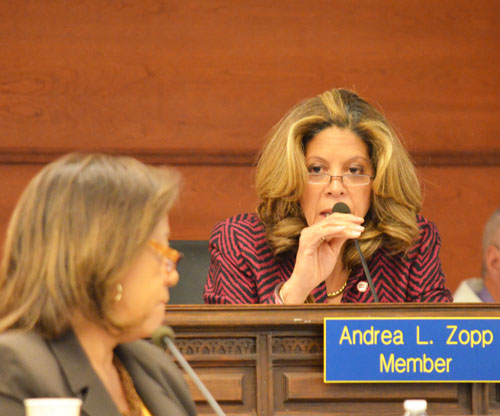 Board member Andrea Zopp voted with the "consensus" at almost every Board of Education meeting during her four years on the Board. Despite the fact that she was serving as CEO of the Chicago Urban League, which supposedly represents the interests of Chicago's Black Community, Zopp voted for every expansion of charter schools across the city, and in May 2013, she voted to close 50 of the city's real public schools, the largest school closing in American history. Most of the schools closed were in the city's black community. Zopp is now running for the Democratic Party nomination for the U.S. Senate, claiming that her experiences with the Urban League and on the Chicago Board of Education make her the right black candidate for the job. Above, Zopp addresses a question to then-CEO Barbara Byrd Bennett during the Board's March 2014 meeting. Substance photo by George N. Schmidt. Zopp and Pritzker, who left the board after the February 2013 meeting to become President Barack Obama�s Commerce Secretary, declined interviews.
Board member Andrea Zopp voted with the "consensus" at almost every Board of Education meeting during her four years on the Board. Despite the fact that she was serving as CEO of the Chicago Urban League, which supposedly represents the interests of Chicago's Black Community, Zopp voted for every expansion of charter schools across the city, and in May 2013, she voted to close 50 of the city's real public schools, the largest school closing in American history. Most of the schools closed were in the city's black community. Zopp is now running for the Democratic Party nomination for the U.S. Senate, claiming that her experiences with the Urban League and on the Chicago Board of Education make her the right black candidate for the job. Above, Zopp addresses a question to then-CEO Barbara Byrd Bennett during the Board's March 2014 meeting. Substance photo by George N. Schmidt. Zopp and Pritzker, who left the board after the February 2013 meeting to become President Barack Obama�s Commerce Secretary, declined interviews.
Zopp emailed that she �had to take exception� to characterizations that the board is a rubber stamp.
�Remember that board meetings are really the tail end of a long process of internal discussions and reviews that occurs before matters are brought to the board,� she said. �Like others, I regularly raised questions and concerns about items on the board agenda with staff in briefings prior to the board meetings. Many times these discussions led to proposed actions being revised to address the concerns or at times removed from the agenda.�
She did not provide examples.
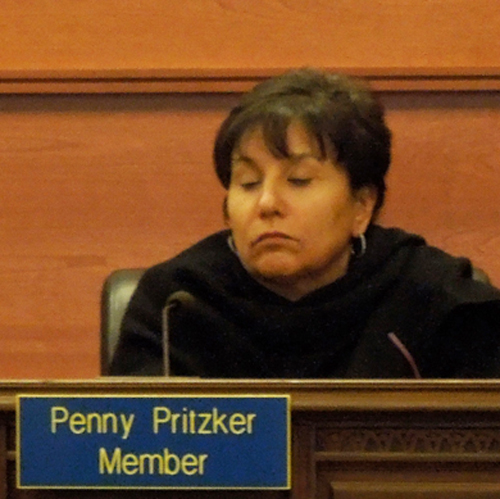 Penny Pritzker during her time as a member of the Chicago Board of Education. Substance photo by George N. Schmidt.�I am very proud of the time I spent serving on the Chicago Board of Education, a responsibility I took very seriously,� Pritzker said in an emailed statement. �Throughout my tenure, I arrived at my decisions through a thoughtful, collaborative, and deliberative process, and ultimately voted for what I believed was in the best interest of the city�s young people.�
Penny Pritzker during her time as a member of the Chicago Board of Education. Substance photo by George N. Schmidt.�I am very proud of the time I spent serving on the Chicago Board of Education, a responsibility I took very seriously,� Pritzker said in an emailed statement. �Throughout my tenure, I arrived at my decisions through a thoughtful, collaborative, and deliberative process, and ultimately voted for what I believed was in the best interest of the city�s young people.�
Quazzo, who replaced Pritzker from June 2013 through June 2015, did not return emailed messages seeking comment. Her assistant said she was traveling all week and was unavailable.
Rod Sierra also did not return messages seeking comment.

